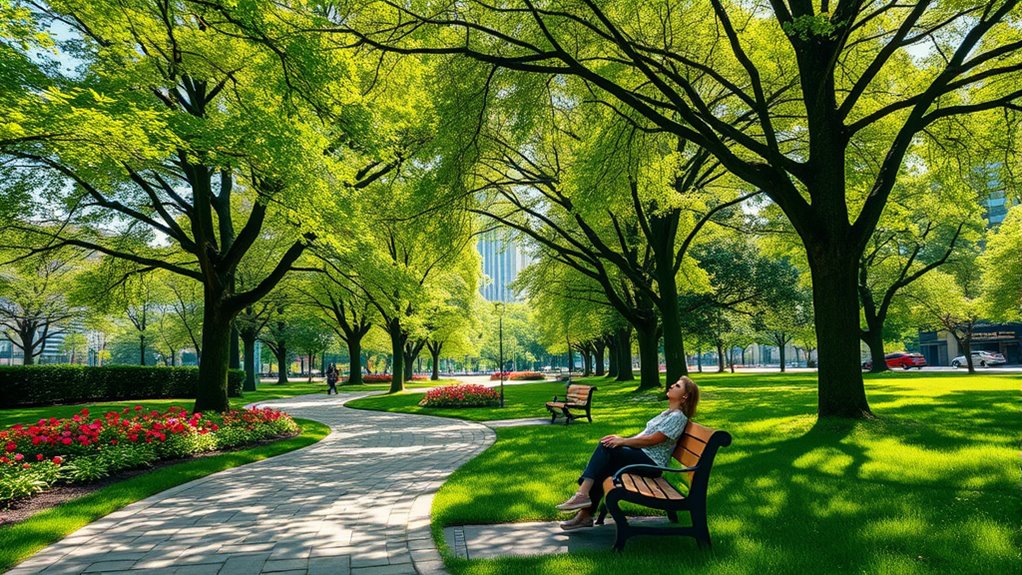Urban parks are essential for your mental health, offering a natural escape from city stress. Visiting green spaces can boost your mood, reduce anxiety, and lower blood pressure. Moving through parks encourages physical activity, which releases feel-good hormones. The sights, sounds, and smells of nature help you disconnect from daily worries and foster mindfulness. Whether you seek solitude or social connection, parks support emotional resilience. Keep exploring to discover how nature in cities truly benefits your well-being.
Key Takeaways
- Urban parks reduce stress and promote relaxation by providing natural scenery, calming sounds, and fresh air.
- Engaging in physical activity in parks releases endorphins, boosting mood and mental resilience.
- Natural environments in parks help lower anxiety and support mindfulness through sensory engagement.
- Parks foster social interactions and community involvement, reducing loneliness and enhancing emotional well-being.
- Regular access to green spaces improves overall mental health by offering mental resets and emotional stability.

Have you ever noticed how spending time in a city park can instantly lift your mood? It’s as if stepping into a green oasis amid concrete and noise clears your mind and restores your sense of calm. That’s no coincidence. Urban parks serve as essential mental health refuges, offering more than just a pleasant escape—they actively improve your emotional well-being. When you walk through a park, you engage with nature, which has been shown to reduce stress hormones and lower blood pressure. The sights, sounds, and smells of green spaces help you disconnect from daily stressors, providing a mental reset that’s often hard to find elsewhere in city life. Additionally, the presence of natural elements like trees and water can enhance your sense of tranquility and promote mindfulness. Being surrounded by trees and plants can boost your mood by increasing levels of feel-good chemicals like serotonin and endorphins. These natural chemicals are your body’s way of fighting off feelings of anxiety and depression. When you take a moment to sit on a bench or stroll along a park trail, you give your brain a break from screens, deadlines, and social pressures. This downtime allows your mind to relax, fostering a state of mindfulness that’s difficult to achieve amid urban chaos. As you breathe in the fresh air and listen to birdsong or rustling leaves, your nervous system calms down, helping you feel more centered and balanced. Parks also provide opportunities for engaging with natural environments, which can significantly enhance mental health benefits. Urban parks also encourage physical activity, which is a proven mood booster. Whether you’re jogging, playing with your kids, or simply walking at a leisurely pace, movement releases endorphins that elevate your mood and reduce feelings of depression. The act of engaging with nature during exercise amplifies these benefits, making you feel more energized and optimistic afterward. Parks create a setting where you’re more likely to be active, even if just for a few minutes, helping you combat the sedentary habits that can negatively impact mental health. The combination of movement, natural scenery, and fresh air creates a powerful synergy that enhances your emotional resilience. Furthermore, parks foster social connections that are essential for mental well-being. Meeting friends, chatting with fellow park-goers, or participating in community activities can reduce feelings of loneliness and isolation. These interactions nurture a sense of belonging and support, which are fundamental for your mental health. Even solitary moments in nature can promote introspection and emotional clarity, giving you space to process your thoughts and gain perspective. In the busy rhythm of city life, urban parks act as communal sanctuaries, offering both solitude and social opportunities that contribute markedly to your emotional stability and overall mental health.
Frequently Asked Questions
How Do Urban Parks Specifically Reduce Stress Levels?
Urban parks reduce your stress levels by providing a peaceful environment where you can escape daily pressures. As you walk or sit amidst greenery, your body relaxes, lowering cortisol levels. The natural setting encourages mindfulness and quiet reflection, which calms your mind. Additionally, fresh air and sunlight boost your mood and energy. Spending time in parks helps you disconnect from digital overload, leaving you feeling more relaxed and centered.
Can Green Spaces Improve Cognitive Functions in City Residents?
Yes, green spaces can boost your cognitive functions. When you spend time in parks, your brain gets a break from overstimulation and stress, allowing for better focus and problem-solving skills. The natural environment stimulates your senses in a calming way, enhancing memory and creativity. Regular visits to green spaces help you process information more efficiently, making it easier to learn, concentrate, and think clearly amid the busy city life.
What Types of Plants Are Most Beneficial for Mental Health?
You’ll find that plants like lavender, jasmine, and chamomile are especially beneficial for mental health. Their aromas can reduce stress and promote relaxation, helping you feel calmer and more centered. Incorporate these plants into your outdoor spaces or even your home to boost your mood. Additionally, greenery with vibrant colors, such as sunflowers or marigolds, can lift your spirits and create a more soothing environment.
How Does Park Design Influence Mental Well-Being?
You can boost your mental well-being by choosing parks with thoughtful design. Features like winding paths, diverse plant life, and quiet zones encourage relaxation and reflection. Accessibility matters, so easy entry and inviting layouts help you feel comfortable. Incorporate natural elements such as water features and shaded areas to reduce stress. When parks are well-designed, they invite you to unwind, reflect, and reconnect with nature, improving your overall mental health.
Are There Differences in Mental Health Benefits Among Various Age Groups?
You’ll find that different age groups experience mental health benefits from parks in unique ways. Children often feel joy and curiosity, boosting their creativity and reducing anxiety. Adults might find parks offer a peaceful escape, lowering stress levels. Seniors gain comfort and social connection, which combat loneliness. Remarkably, these benefits often overlap, showing that regardless of age, urban parks serve as essential mental health refuges, enriching everyone’s well-being.
Conclusion
By embracing urban parks, you access a powerful antidote to city stress, transforming concrete jungles into sanctuaries of serenity. These green spaces aren’t just nice to have—they’re essential for your mental well-being, offering a gust of fresh air that can clear even the heaviest mental fog. Ignoring their benefits is like denying sunlight to a sunflower; without them, your mental health risks wilting away. So, make time for parks—they’re your secret weapon for a happier, healthier life.










